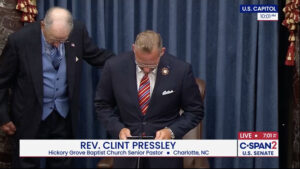
NASHVILLE, Tenn. (BP)–Two recent polls regarding parents’ views on sex education have produced conflicting results, with one poll saying the vast majority of American parents want their children’s sex education classes to emphasize abstinence until marriage and the other saying most parents believe the most appropriate approach is something called “abstinence-plus.”
The first poll, conducted by Zogby International and Focus on the Family, found that parents strongly oppose the values and messages of comprehensive sex education, which assumes teens will become sexually active and therefore must be given easy access to condoms and contraception.
The second poll, conducted by National Public Radio, the Kaiser Family Foundation and Harvard’s Kennedy School of Government, found that while only 7 percent of Americans say sex education should not be taught in public schools, a plurality believes the most appropriate approach is to teach that abstinence is best. But with those parents registering doubt whether all teens will abstain, they said students also should be taught about condoms and contraception.
The NPR poll also found that 30 percent of the principals of public middle and high schools where sex education is taught reported that their schools teach abstinence only. NPR said 47 percent of the schools taught abstinence-plus — an approach that teaches abstinence first but also includes condoms and contraception — and 20 percent taught that making responsible decisions about sex was more important than abstinence.
Zogby/Focus reported that 68 percent of parents want schools to teach teens that individuals who remain abstinent until marriage have the best chances of marital stability and happiness, according to a Jan. 28 news release.
The same poll said 91 percent of parents want their children to be taught that sex should be linked to the type of love and commitment found in marriage and 56 percent said information about contraception should either not be taught as a subject or taught in a class separate from abstinence, such as a health or biology class.
Forty percent of parents in the Zogby/Focus poll said abstinence and contraception should be combined in a single class, though only 2 percent said sex education should focus on teaching teens how to use condoms.
NPR reported only 15 percent of Americans believe schools should teach only about abstinence from sexual intercourse and should not provide information on how to obtain and use condoms and other contraception, according to a Feb. 5 article on NPR’s website.
A plurality — 46 percent — believes that the most appropriate approach is “abstinence-plus,” teaching abstinence first but also including condoms and contraception since not all teens will abstain in an “abstinence-plus” approach. Another 36 percent of those polled by NPR said abstinence is not as important as sex education teaching teens how to make responsible decisions about sex.
Americans are divided rather evenly over the approach to teaching sex and sexuality in schools, NPR found. Respondents to the poll were asked to choose which of two statements was closer to their belief: 1) “When it comes to sex, teenagers need to have limits set; they must be told what is acceptable and what is not.” Or 2) “Ultimately teenagers need to make their own decisions, so their education needs to be more in the form of providing information and guidance.”
According to NPR, 47 percent selected the first statement and 51 percent selected the second. The number one reason parents gave for why they prefer their children abstain from sex is that they are worried their children would have sexual intercourse before they are psychologically and emotionally ready.
“Parents are well-intentioned but confused,” observed Richard Ross, professor of student ministry at Southwestern Baptist Theological Seminary and one of the founders of the True Love Waits abstinence movement.
“In this [NPR] study the concern that teens ‘might have sexual intercourse before they are psychologically and emotionally ready’ exceeded concerns about disease and pregnancy,” Ross noted. “Since condoms and birth control cannot protect vulnerable minds and personalities from the consequences of immoral behavior, it seems strange that any percentage of parents would call for programs centered on those elements.”
Ross recounted an appearance on NBC’s “Today” show interview with Katie Couric as the True Love Waits movement gained popularity in the early 1990s.
“Katie asked excellent questions that allowed me to explain why delightful teenagers all over the nation were going public with their decision to be abstinent until marriage,” Ross said. “As the lights went down on our part of the set, I expected Katie to leave quickly for her next segment. Instead, she sat back down and became very thoughtful.
“She said, ‘Mr. Ross, I need to tell you that much of what you are saying appeals to me. But let me ask you just one more question. Can’t we have a morality without bringing God into the discussion?’
“Katie is very bright and actually articulated the question that all our culture is asking these days,” Ross said. “Confused parents and even national leaders are trying desperately to construct something to give meaning and structure to their lives. I say to them what I said to Katie. ‘No, Katie, we can’t build our own morality. If God is not the foundation and our source of ultimate truth, then we are just making this up as we go.'”
The Zogby/Focus poll was based on interviews with 1,008 parents of children under age 17. The NPR poll was based on a survey of the general public among a sample of 1,759 respondents 18 years of age or older, including an oversample of parents of children in the seventh through 12th grade, resulting in 1,001 parents. Also included in the NPR poll was a survey of principals conducted among 303 principals of middle, junior and senior high schools across the nation.
–30–
For more information on the debate over same-sex “marriage,” visit BP’s story collection at:
https://www.bpnews.net/samesexmarriage















